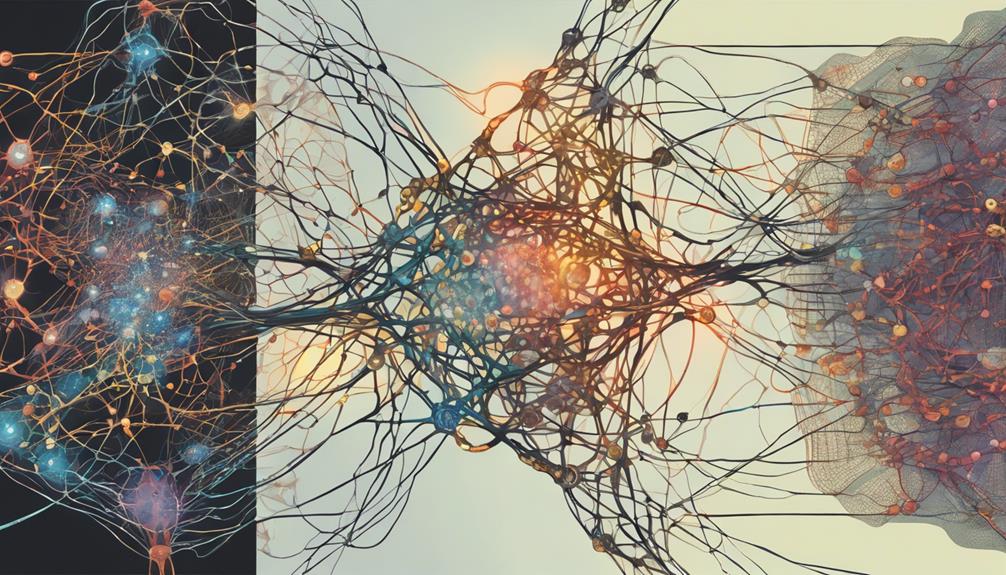Genetic inheritance profoundly influences cognitive abilities, with the X chromosome carrying genes essential for intelligence, often inherited from the mother. Research suggests that approximately 60% of intelligence is determined by genetics, impacting cognitive development. Intelligence encompasses critical thinking, logical reasoning, and the ability to understand complex information. Evolution of IQ testing has provided insights into cognitive assessment, with tools like the WAIS-IV evaluating multiple cognitive domains. Higher intelligence levels correlate with enhanced academic performance and influence social interactions. Understanding the genetic code of intelligence reveals the intricate interplay between genetics and cognitive abilities, shedding light on the role DNA plays in shaping intellect.
Key Takeaways
- Intelligence is genetically influenced, with the X chromosome carrying key intelligence genes.
- Mothers are often primary contributors of intelligence genes to their children.
- Genetic inheritance accounts for about 60% of intelligence, impacting cognitive development.
- Understanding intelligence involves critical thinking, logical reasoning, and comprehension of complex information.
- Ongoing research deepens the understanding of intelligence, emphasizing genetic predispositions.
Genetic Inheritance and Intelligence
The genetic inheritance of intelligence, particularly through the X chromosome, plays a significant role in shaping an individual's cognitive abilities. Research suggests that genes responsible for intelligence are passed down through this chromosome, with the mother often being the primary contributor.
Studies indicate that approximately 60% of intelligence is determined by genetics, while the remaining percentage is influenced by environmental factors. Conditional genes inherited from mothers can impact an individual's intelligence levels, highlighting the importance of genetic predispositions in cognitive development.
Understanding the genetic basis of intelligence can provide insights into how certain abilities are inherited and offer potential avenues for further research into enhancing cognitive functions through targeted interventions.
Understanding Intelligence Definition

Intelligence encompasses the capacity to think critically, reason logically, and comprehend complex information. It involves the ability to understand, think, gain knowledge, and use it effectively. Intelligence requires pausing to think and not acting purely on instinct.
Demonstrations of intelligence can be seen in behaviors like delayed gratification. For instance, the Marshmallow test highlights the link between intelligence and decision-making.
Early attempts to define intelligence date back to the late 1800s, with the mother's IQ consistently factoring into research. Alfred Binet's creation of the first IQ test aimed to identify struggling students.
As intelligence is a complex trait influenced by various factors, ongoing research continues to deepen our understanding of this multifaceted concept.
Evolution of IQ Testing Methods

Over time, advancements in psychometrics have led to significant enhancements in the methods used for evaluating cognitive abilities.
The evolution of IQ testing methods began with Alfred Binet's creation of the first IQ test to identify struggling students. This initial test laid the foundation for modern IQ assessments, which have since evolved to include more detailed measures like the WAIS-IV.
The Wechsler Adult Intelligence Scale – Fourth Edition provides a more accurate intelligence score by evaluating multiple cognitive domains, such as Verbal Comprehension, Perceptual Reasoning, Working Memory, and Processing Speed.
These advancements in IQ testing methods have allowed for a more nuanced understanding of cognitive abilities and have enabled researchers and educators to better assess and support individuals' intellectual development.
Impact of Intelligence on Children

Advancements in understanding cognitive abilities have highlighted the significant impact intelligence can have on children's development and academic performance. Intelligence plays a pivotal role in shaping a child's ability to learn, solve problems, and adapt to new situations.
Children with higher intelligence levels often excel in school, demonstrating superior academic performance across various subjects. Additionally, intelligence can influence a child's social interactions, emotional regulation, and decision-making skills.
Understanding a child's intelligence can help tailor educational strategies to support their growth and development effectively. It is vital to consider both genetic inheritance and environmental factors when evaluating the impact of intelligence on children, as a comprehensive approach can provide insights into optimizing their learning experiences and overall well-being.
Historical Insights on Intelligence

Early attempts in the late 1800s to define the concept of intelligence laid the groundwork for further exploration and understanding of cognitive abilities. Historical insights on intelligence have shaped the way we perceive and measure intellectual capacity.
Here are three key points:
- Alfred Binet's development of the first IQ test revolutionized intelligence assessment.
- The consistent factor of the mother's IQ in intelligence research highlights the role of genetics.
- Evolution of IQ tests, with the WAIS-IV as a standard, showcases the ongoing efforts to refine and improve intelligence evaluation methods.
These historical perspectives provide a valuable foundation for current research on intelligence and cognitive capabilities.
Frequently Asked Questions
Can Intelligence Be Solely Attributed to Genes From One Parent?
Intelligence cannot be solely attributed to genes from one parent. While genetic inheritance plays a significant role in determining intelligence, environmental factors also influence cognitive development. A combination of genetic and environmental factors shapes an individual's intelligence.
How Do Environmental Factors Influence Genetic Intelligence Inheritance?
Environmental factors play an essential role in influencing genetic intelligence inheritance. While genes contribute substantially to intelligence, approximately 40% is influenced by environmental factors. Factors like education, nutrition, and social interactions can impact intelligence development.
Are There Specific Genes Responsible for Different Aspects of Intelligence?
The search for specific genes governing various facets of intelligence remains elusive. While genetic factors play a significant role, the intricate nature of intelligence suggests a multifaceted genetic landscape contributing to its complexity and diversity.
Can Intelligence Levels Change Over Time Due to External Factors?
Intelligence levels can change over time due to external factors such as education, experiences, and environmental stimuli. These factors can influence cognitive development, problem-solving abilities, and overall mental acuity, leading to fluctuations in intelligence levels.
Is There a Correlation Between Intelligence and Emotional Intelligence?
Intelligence, the beacon of the mind's strength, intertwines with emotional intelligence, illuminating the path of understanding human complexities. The correlation between cognitive prowess and emotional acumen shapes nuanced interactions, fostering holistic intelligence development.
Conclusion
In the intricate tapestry of genetic inheritance and intelligence, we reveal a fascinating mosaic of interwoven complexities that shape human cognition.
Like a finely crafted puzzle, the genetic code of intelligence holds the secret to revealing the mysteries of our intellectual capabilities.
Through a meticulous exploration of this intricate web of genes and environment, we gain a deeper appreciation for the intricate mechanisms that govern the essence of human intelligence.










